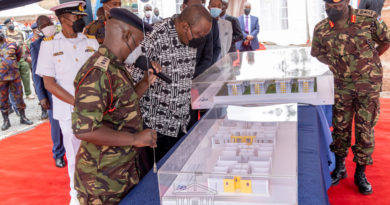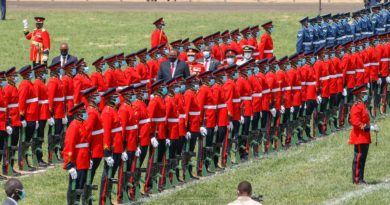President Uhuru Kenyatta Speech during the 70th Session of the UN General Assembly
From president.go.ke
His Excellency Mr. Mogens Lykketoft, President of the 70th Session of United Nations General Assembly,
His Excellency Mr. Ban Ki-moon, Secretary-General of the United Nations,
Excellencies, Heads of State and Government,
It is my pleasure to speak at this 70th Session of the United Nations General Assembly. Let me congratulate you, Mr. President, on your election as President of this historic session. We are confident that your vast diplomatic experience will steer you and contribute to the achievement of the objectives you have set. Kenya fully supports your leadership, and will constructively engage with you towards realizing the objectives of this historic session.
Mr. President, 70 years ago, in the aftermath of the Second World War, the globe witnessed the establishment of the United Nations with the objective of saving succeeding generations from the recurrence of war. Thereafter, the world took up the challenge to defeat colonialism and its ideologies. That era was also seen as the precursor to greater global equality, increased social equity and the beginning of the fight against mass poverty. It led to democracy and freedom.
Today, the 70th Anniversary of the founding of the United Nations is being celebrated against a backdrop of numerous global challenges. The adverse effects of globalization, the debilitating consequences of the global economic and financial crisis and the negative effects of climate change have increased the vulnerability of the global economy and affected United Nations member states to varying degrees.
Today, just as in the last 70 years, the challenges and aspirations faced by developing countries, including peace and security, development, protection of human rights, environmental conservation and global governance remain as real and relevant as ever, and they are expected to continue to be of primary concern for a number of United Nations Member States in the coming years.
Mr. President, The maintenance of international peace and security continues to face increasing challenges due to the increased intensity and complexities in conflicts in the Middle East and Africa, especially in the Great Lakes region, Horn of Africa and in the Sahel. The continued grave security situation in Eastern Africa and further afield is of particular concern to Kenya. Kenya has continued to invest billions of shillings in the maintenance of regional peace and security, while many Kenyan lives have been lost in our quest for peace. Kenya therefore, implores the international community, in particular the United Nations Security Council to shoulder its responsibility in a manner that has a direct impact to the resolution of those conflicts. There is need to “promote peaceful and inclusive societies for sustainable development, provide access to justice for all and build effective, accountable and inclusive institutions at all levels as stated in Goal 16 of the SDGs in order to realize sustainable peace all over the world.
Global terrorism and violent extremism remain a major threat not only to the Republic of Kenya but also to the entire world. In the recent past, Al-Shabaab terrorists have been targeting the civilian population in Kenya on the pretext that Kenya has deployed her troops in Somalia. The continued threat by Al-Shabaab has had a great impact on Kenya’s national security and economy at large. Kenya therefore calls upon the international community to take strong, and enforceable action in tackling Al-Shabaab and other terrorist groups including the phenomenon of foreign fighters. At the same time, we must collectively address the radicalization of the youth as the pipeline for global terrorism and its financing at the grassroots, where most of the youth are radicalized.
Mr. President, Somalia remains an important neighbor of Kenya. Kenya and Somalia share strong historical, cultural and trading ties that have benefited both societies. Somalia remains of major concern to the international community and Kenya in particular, due to the long standing crises and security situation, which remains a grave threat to peace and security in Eastern African region, as well as the entire Horn of Africa. While Al-Shabaab’s capacity to launch terrorist acts inside Somalia has been diminished, Al-Shabaab’s continued presence in Somalia has a negative impact on the security, stability and prosperity of Somalia. Kenya Defence Forces within the framework of African Union Mission in Somalia (AMISOM), will continue working closely with the Somalia National Army.
Despite the threat posed by Al-Shabaab militants on Kenya, we will stand firm in support of the Federal Government of Somalia and the people of Somalia. Kenya therefore calls on the international community to support the Federal Government of Somalia in securing its territory. We remain committed together with other international partners in providing the necessary support to the Federal Government of Somalia in implementing its “Vision 2016”.
Kenya is concerned about the emerging governance and humanitarian crisis in South Sudan in the aftermath of the political crisis since 2013. The crisis in South Sudan remains an issue of great concern not only to Kenya but to the IGAD region and the larger international community. Kenya welcomes the recently signed peace treaty and calls upon both parties to seek a peaceful solution to the conflict, and urges the international community, especially the United Nations to support IGAD Plus Peace Initiative’s efforts geared towards the realization of comprehensive, just and sustainable peace in South Sudan through the enforcement of peace and security arrangements, support for institutions of governance and democracy, support for the de-militarization of South Sudan and response to the current humanitarian crisis. South Sudan,
Mr. President needs to get to the path of peace, development and reconstruction, and to do so urgently. Mr. President, At the beginning of this millennium we adopted the Millennium Development Goals (MDGs). Since then, the MDGs have galvanized and catalyzed international action towards eradicating poverty and other social targets. The goals demonstrated that a set of development goals and targets can be important drivers of change.
Indeed, where successfully implemented, the MDGs have had a positive impact on the lives of millions of people. But the results have been mixed and uneven across countries. Many developing countries remain off track and have not been able to meet their 2015 deadline. This therefore made it necessary to begin a global process to shape a new development agenda,with the starting point being the unfinished business of theMDGs and creation of a truly transformative and inclusive development agenda as was agreed at the United Nations Summit on Sustainable Development held in 2012 in Rio de Janeiro, Brazil.
The new agenda “Transforming our world: The 2030 Agenda for Sustainable Development”therefore seeks to address transformative challenges which cut across the social, economic and environmental dimensions of development. But transformation and inclusion does not mean that we abandon our responsibility to support countries in greatest need, on the contrary, we must redouble our efforts as an international community to ensure that no one is left behind, and, indeed, that no country is left.
Mr. President, 2015 will be remembered in history as the year during which important conferences were held, that placed the world on a sustainable development path, beginning in March with the high-level meeting on disaster risk reduction, the July conference on financing for development and the just concluded adoption on the new Agenda, “Transforming our world: The 2030 Agenda for Sustainable Development” whose ambitious outcome has put us on a path to a new sustainable development agenda,with a set of sustainable development goals.
The forthcoming climate change summit in November/December this year in Paris, France is expected to reach an inclusive, balanced,ambitious, and acceptable climate change agreement,including its financing, that will turn plans into actions.Mr. President, the Paris Conference must succeed, failure is not an option. The Third UN World Conference on Disaster Risk Reduction held in March, 2015 in Sendai,Japan, underscored the importance of promoting disaster risk reduction efforts at the international and regional levels as well as the national and local levels.
The conference noted that the cost of addressing the effects of disaster risk remains a burden to many countries. As a result, this continues to undermine efforts to address poverty eradication and food security amongst other challenges.Going forward, the conference agreed that it would be important to mitigate the effects of disaster risk by putting in place resilience measures. Member States would have to undertake reduction of disaster losses, in lives andin the social, economic and environmental assets of communities. The conference called for full commitment and involvement of all actors concerned, including governments,regional and international organizations, and civil society including volunteers, the private sector and the scientific community. The conference also called on Governments to mobilize the required means of implementation in order to address the effects of disaster risk reduction.This requires building of the required capacities especially in defining risk and mainstreaming risk pricing in order to inform priorities in public expenditures. While capacity building should cover enhanced global risk analysis and extend to local authorities and sub-national levels for effective implementation.
Risk management has to form part of the development policies of governments and should be mainstreamed at all levels of national development. In order to address the risk reduction, there should be a sound follow-up mechanism for monitoring and accountability. We are glad to note that disaster risk reduction is part of the new sustainable development Agenda. Mr. President, The Third Conference on Financing for Development (FfD) held in July, 2015, in Addis Ababa, Ethiopia reached important decisions as a follow-up on the commitments of the Monterrey and Doha, to further strengthen their framework to financing sustainable development. The conference outcome document focused on both financial and non-financial means of implementation. The required resources will have to be obtained through domestic resource mobilization; domestic and international private and business finance; and international public finance,which includes, Overseas Development Assistance. However,domestic resource mobilization remains key in raising required resources to finance development.
This calls for the need to address fiscal constraints within the available fiscal space, supported by strengthening of capacities for tax authorities. The non-financial means which include international trade as an engine of development; debt and debt sustainability; addressing systemic issues; science,technology, innovation and capacity building and data monitoring and follow-up have to be implemented. This being said, the role of aid and ODA remains key to the valued and credibility on international development cooperation. It is therefore imperative that development partners continue to redouble their efforts to support and finance programmes in developing countries. Kenya places importance on domestic resource mobilization to cover both her recurrent and development commitments.
We have noted the importance of public international finance as a complement to the domestic public resources, and we have therefore put in place a Kenya External Resources Policy with emphasis on sourcing concessional or semi-concessional support for key projects.To effectively coordinate delivery of external aid architecture, we have put in place initiatives to fully implement the 2005 Paris Declaration on ‘Aid Effectiveness’. Kenya therefore remains committed to putting in place appropriate follow-up and review mechanisms, which will ensure that all the means of implementation are reviewed periodically.
Going forward, we need to address capacity deficits in key institutions such as our national statistical offices in order to enable themcapture quality, timely and reliable data required for the follow-up and review process.
Mr. President, I wish to express my appreciation to the United Nations Secretary-General for the successful outcome of the Summit for the Post 2015 Development Agenda, “Transforming our World: The 2030 Agenda for Sustainable Development”. A few days ago,we adopted a bold, ambitious and transformative sustainable development agenda for the next 15 years. This pact was a culmination of more than three years of inter governmental negotiation process, which began with the United Nations Conference on Sustainable Development in Rio, Brazil in2012. We are glad to note that the Agenda recognizes ending poverty in all its forms everywhere as its overarching goal.
The goals and targets set by the agenda are universal and will apply to all countries while recognizing different realities and capabilities. This new Agenda recognizes that sustainable development cannot be realized without peace and security; and peace and security will be at risk without sustainable development. This therefore calls for building peaceful, inclusive and well-governed societies with responsive institutions as the basis for shared prosperity.Fundamentally, the agenda reckons that we cannot reach our development goals without addressing human rights and complex humanitarian issues at the same time.
The Agenda addresses the requirements for all humanity to be able to live decent lives free from poverty, hunger and inequality,with all men and women, girls and boys able to develop their full potential. It commits all of us to be responsible global citizens, caring for the less fortunate as well as for our planet’s ecosystem and climate action on which all life depends. It is important to note that, the agenda received valuable inputs from civil society, the private sector, academia, parliamentarians and millions of people from every corner of the world who shared their vision of“the world we want”.
Mr. President, Kenya was honoured and proud for the important role it played in the Post 2015 Development Agenda process, by Co-Chairing the Open Working Group on Sustainable Development Goals (SDGs) and by Co-facilitating the inter-governmental negotiations on the Post 2015Development Agenda. It is now the responsibility of all countries to implement this new Universal Development Agenda. The relevant means for achieving this have been developed and integrated in the sustainable development goals to be complemented by the outcome of the Third Conference on Financing for Development which I referred to earlier. Implementation and follow-up will be critical.
We will therefore need all partners on board to make this a success. To complete ournew path to sustainable development, we look forward tothe Twenty-First Session of the Conference of the Parties to the United Nations Framework Convention on Climate Change (COP21) in November-December, 2015 in Paris, France. COP21 remains a crucial conference, during which global leaders need the political will to reach the expected outcome that will enable the conference to achieve a new international agreement on the climate, applicable to all countries, withthe aim of keeping global warming below 2°C.
We therefore commend the efforts of France in facilitating the search for consensus by the United Nations in climate negotiations. Similarly,Kenya will continue to constructively engage to ensure that we reach a universal, meaningful climate change agreement at“Paris 2015”.
Mr. President, Kenya is happy to note that efforts to deepen our regional integration within the East African Community (EAC) continue to bear fruit. The EAC remains one of the fastest growing regional integration bodies and we hope this will continue. The EAC remains committed to widening and deepening co-operation among its Partner States in political, economic and social fields for their mutual benefit. Over the years, the EAC has expanded its membership from the three founding Partner States to five, which are Burundi, Kenya, Rwanda, Tanzania and Uganda. This signifies a wider market that bears great strategic and geopolitical significance and prospects of a renewed and reinvigorated East African Community.
Much progress has been recorded in the EAC since the establishment of the East African Customs Union in 2005. We are glad that much more progress continues to be recorded since the establishment of the Common Market in 2010.Subsequently, the Protocol for the establishment of the East African Monetary Union is already in place and its implementation is underway. We remain committed to fast-track the process towards an East African Federation as a demonstration of the determination by the people of East Africa to construct a powerful and sustainable East African economic and political bloc.
Mr. President, Excellencies, Ladies and Gentlemen,
Looking into the future – The new Agenda “The 2030 Agenda for Sustainable Development” has brought a new dawn for global development. We must collectively avoid the pitfalls of the past 70 years. We must focus all efforts to ending poverty and to promoting sustainable peace and security. We should remain ambitious, yet practical, in order to bring real change to the lives of poor people, as well as guarantee the sustainability of our planet. Kenya will remain robust in the implementation of “The 2030 Agenda for Sustainable Development”. We will build on our experience from the implementation of the Millennium Development Goals (MDGs).At the same time, Kenya will pay special attention to fundamental sustainable development issues that were previously left out of the MDGs framework, especially strengthening the means of implementation and revitalizing global partners for sustainable development, as well as the promotion of peaceful and inclusive societies which remains critical for the realization peace and security, and sustainable development. In conclusion Mr.President, I assure you that Kenya remains committed to continuing to play its rightful role in the global community to remain an anchor of peace and security in our region and foster regional, continental and global cooperation for accelerated economic and social development and prosperity for all.
I thank you




